Key takeaways:
- Political commentary, especially satire, makes complex issues more accessible and prompts critical thinking about governance.
- Trust in the commentator significantly influences audience perception and engagement with political discourse.
- Satirists hold power accountable through humor, making serious topics relatable and fostering meaningful conversations.
- Examples of effective satirical commentary, like Jon Stewart and John Oliver, highlight the blend of humor and critical insight that resonates with audiences.
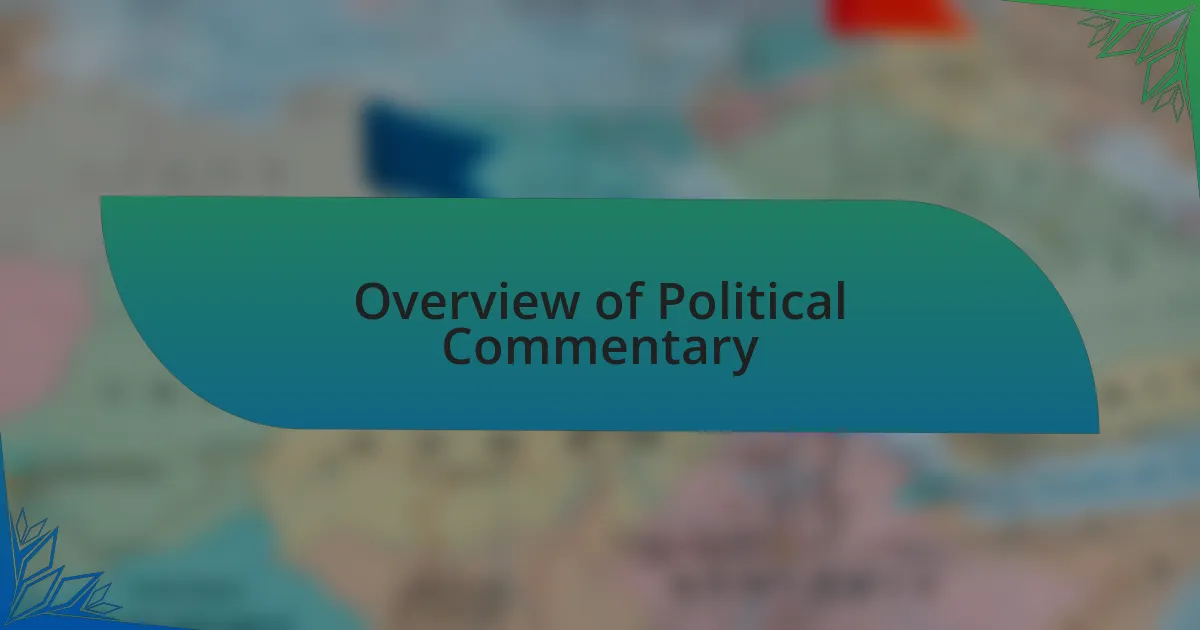
Overview of Political Commentary
Political commentary serves as a crucial lens through which we can analyze the machinations of power and governance. I often find myself reflecting on the various voices that shape public discourse. Isn’t it fascinating how opinions, whether from journalists, analysts, or satirists, reflect the political climate’s pulse?
What stands out to me is how satirists distill complex political issues into accessible narratives. I recall a moment watching a satirical sketch that cleverly unraveled a convoluted policy debate, making me realize that humor can often convey truths that traditional commentary might miss. It’s almost as if these satirists hold a mirror to society, prompting us to ask uncomfortable questions.
Moreover, the realm of political commentary is dynamic and often polarizing. I remember discussing a political event with friends, where everyone’s interpretation hinged on who they trusted for insights. This highlights the emotional undercurrents in commentary; it’s not just about facts, but how the messenger’s credibility affects our perception and trust. Have you ever found yourself swayed by a compelling argument simply because of who presented it?
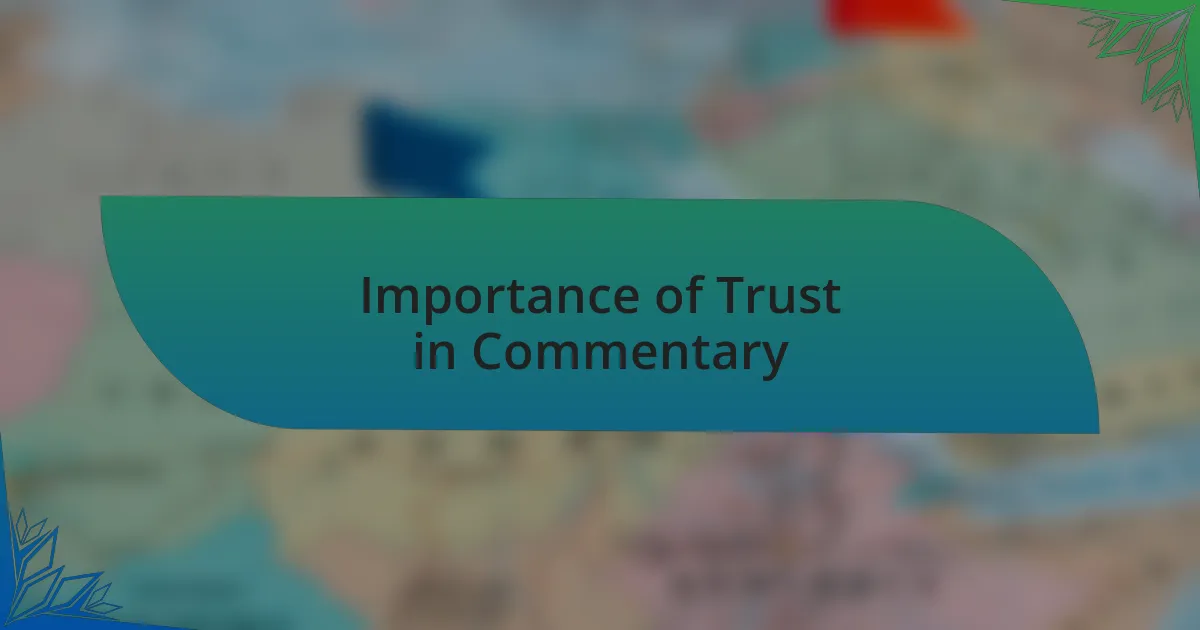
Importance of Trust in Commentary
Trust in commentary acts as the foundation of our understanding of politics. When I engage with different viewpoints, I’ve learned that the credibility of the commentator can significantly influence my perception. Ask yourself: do I feel more aligned with someone I trust or someone whose motives seem questionable? The answer can shape not just our individual beliefs, but also the collective discourse.
For me, the connection between the audience and the commentator is deeply personal. A satirist who speaks truthfully about societal issues opens a dialogue, while a politician often feels distant and strategic. I remember laughing at a sketch that satirized a politician’s contradictory statements, realizing that humor allowed me to digest critical insights without the heaviness that sometimes accompanies political rhetoric. This relationship of trust is what makes commentary resonate on a deeper emotional level.
Interestingly, the nature of trust in commentary also varies through our experiences. I once found myself mouthing off at a political event, sharing insights I’d gleaned from someone I trusted, only to realize later that not everyone shared that trust. It made me wonder: how much does our personal connection to a commentator influence our acceptance of their arguments? This interplay of trust and opinion illustrates the importance of discerning who we choose to listen to, reminding us that commentary is as much about relationships as it is about the ideas presented.
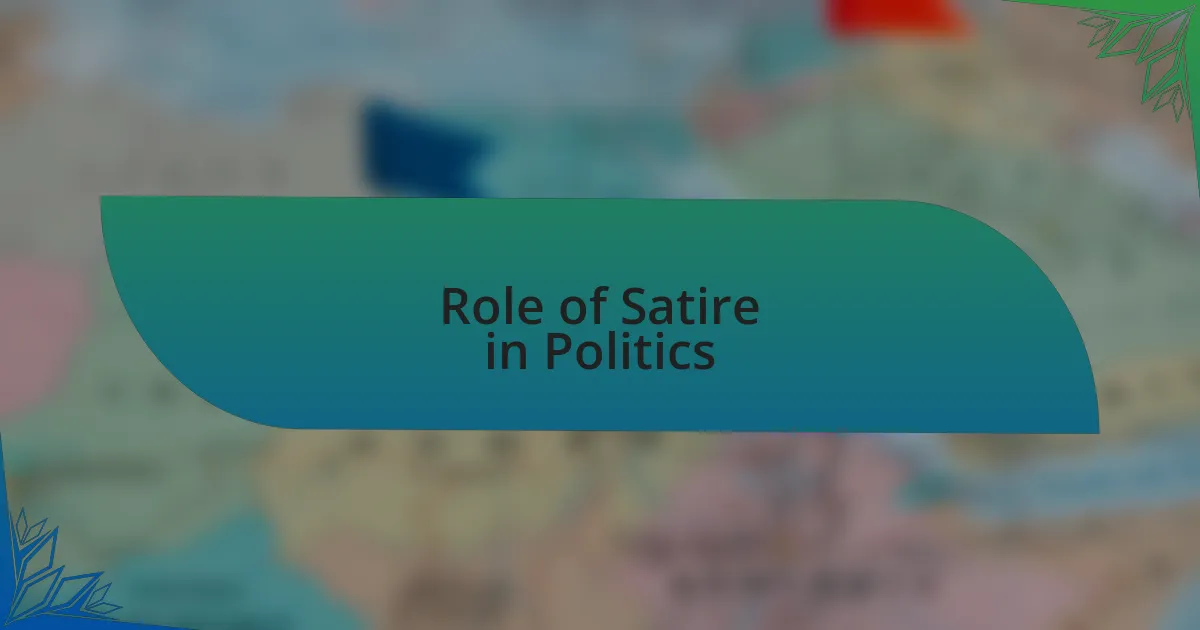
Role of Satire in Politics
Satire plays a critical role in politics by serving as a lens through which we can examine the absurdities and contradictions inherent in political life. I once watched a satirical news segment that cleverly highlighted the discrepancies between politicians’ promises and their actions. It not only made me laugh but also encouraged me to think critically about the narratives we are often fed. Why do we laugh? Perhaps it’s because humor breaks down defenses, making us more receptive to uncomfortable truths.
Moreover, satirists often take risks that politicians shy away from. In my experience, during a political debate, a comedian’s quick wit about a candidate’s missteps struck a chord with the audience, allowing us to confront serious issues while still enjoying the moment. Isn’t it fascinating how laughter can emerge as a tool for social change? It effectively fosters an environment where we can engage with heavy topics in a more accessible and relatable way.
Satire not only entertains but also informs by prompting conversations that might otherwise feel too confrontational. I recall chatting over coffee with friends about a satirical sketch that critiqued government policy, and it opened up a rich discussion on a topic we usually avoided. In that moment, I realized that satire serves as a bridge, connecting us to the political landscape while inviting thoughtful dialogue. Isn’t that a powerful role for humor in our understanding of politics?
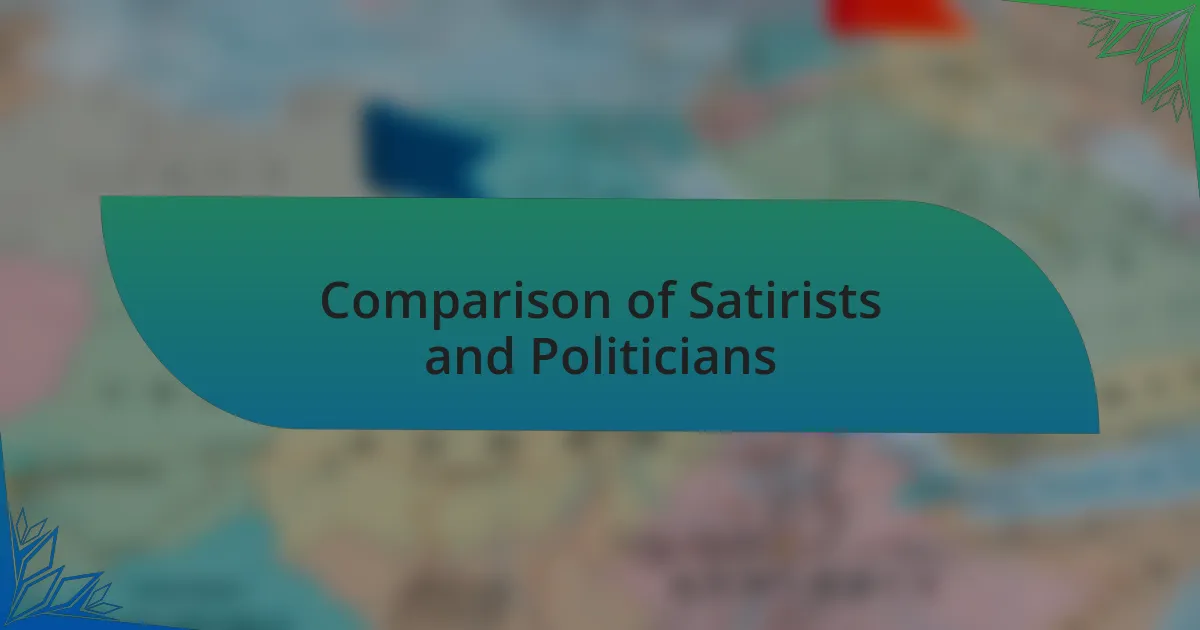
Comparison of Satirists and Politicians
Satirists and politicians operate on fundamentally different wavelengths. While politicians often present carefully crafted images, satirists reveal the underlying truths hidden beneath the gloss. I remember watching a late-night show where the host skewered a politician for their contradictory statements, and it struck me how this bold approach brought hidden ethical dilemmas to light. It made me wonder: are we really more comfortable facing the absurdity through humor than through the formal rhetoric of politicians?
Another interesting aspect is accountability. Politicians are often shielded by their roles and structures, which can allow them to sidestep difficult questions. In contrast, satirists face immediate feedback from their audience; if a joke falls flat, they’re the first to feel it. I once felt a rush of relief while listening to a stand-up comedian dissect a policy blunder with razor-sharp humor. In that moment, I realized how important it is for those in power to be challenged openly and directly.
Finally, what captivates me about satirists is their ability to relate complex political situations to everyday experiences. I once encountered a satirical article that linked a government scandal to a popular reality show, and suddenly, I could understand the implications in a way that made sense to me. It’s a stark contrast to the often convoluted jargon of political speeches that leave many feeling detached. In essence, satirists create a relatable narrative, bridging gaps that politicians sometimes fail to even see.
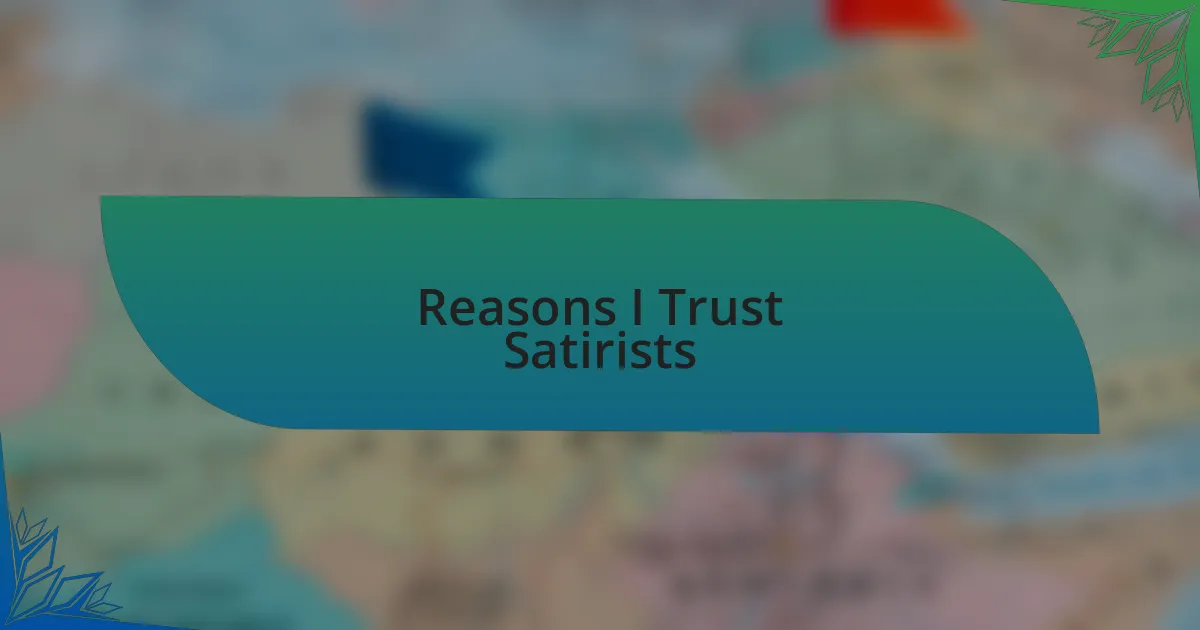
Reasons I Trust Satirists
When I think about why I trust satirists, one key reason stands out: their knack for honesty. I recall an episode of a political satire show where the host tackled a current event with a sharp wit that cut through the usual media fluff. It made me feel like I was finally hearing someone speak the truth—a refreshing contrast to the often evasive language politicians use. Isn’t it easier to trust someone who lays it all bare, even if it’s wrapped in humor?
Another reason I gravitate towards satirists is their unique ability to make complex issues digestible. There was a time I struggled to grasp the nuances of healthcare policy until a satirical piece broke it down into simple, relatable terms. Suddenly, it wasn’t just a distant topic; it felt like a conversation I was part of. Doesn’t it make a difference when serious subjects are presented in a way that resonates with our daily lives?
Lastly, I find satirists to be like the conscience of society, holding power to account in ways that resonate deeply. I remember attending a live show where the satirist’s commentary on government corruption provoked not only laughter but also a reflective silence among the audience. It’s moments like these that make me question: are they doing the job of watchdogs better than those officially in power? In their critiques, I see both a challenge to authority and a call for transparency that I yearn for in governance.
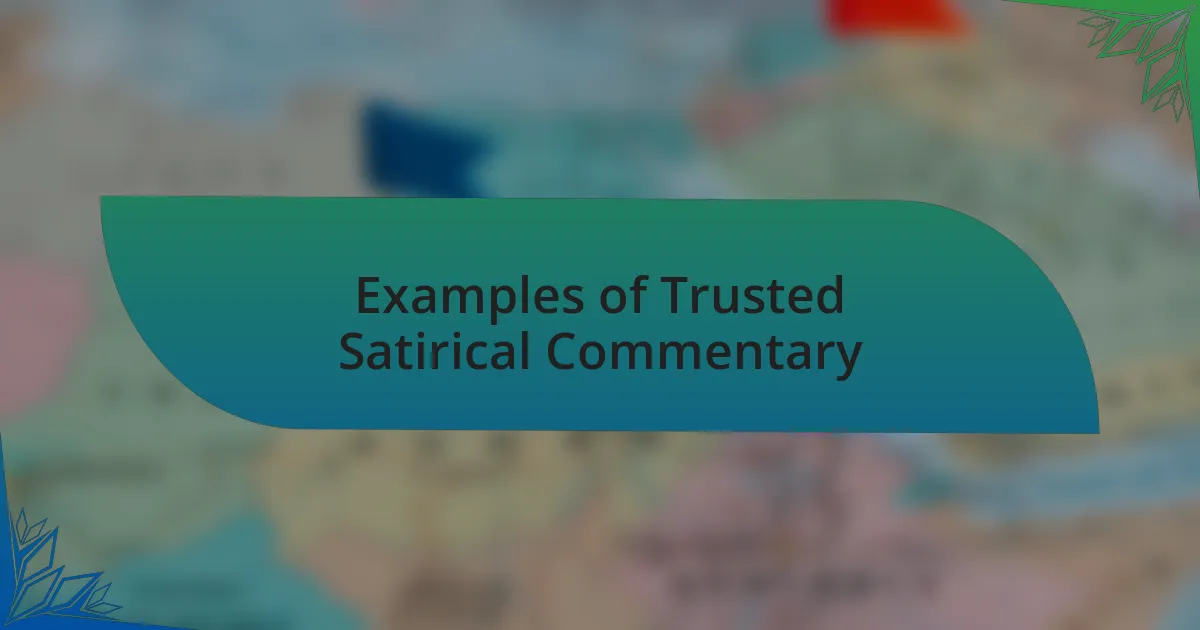
Examples of Trusted Satirical Commentary
One standout example of trusted satirical commentary for me is Jon Stewart’s tenure on “The Daily Show.” I clearly remember his poignant, yet humorous dissection of political blunders, which often mirrored my own frustrations. Watching him tackle a misleading news segment felt like having a friend point out the absurdity in a complicated situation, making me not only laugh but also rethink the issues at hand.
Another memorable instance that resonated with me was John Oliver’s “Last Week Tonight.” During a segment on net neutrality, he tackled a complex topic that left many feeling confused. I remember how he infused emotion into the facts and broke down the consequences of deregulation, igniting a passion for advocacy in viewers, including myself. Isn’t it powerful when someone can turn seemingly dry statistics into a call to action?
Then there’s Samantha Bee, whose show “Full Frontal” bravely addresses underreported issues while wielding humor as her weapon. I distinctly recall her coverage of the importance of women’s rights in politics—her blend of satire and earnestness struck a chord with me. It made me realize that these discussions, though often overlooked, are vital and deserve our attention. How refreshing it is to see someone confront these challenges and motivate us to stay informed!
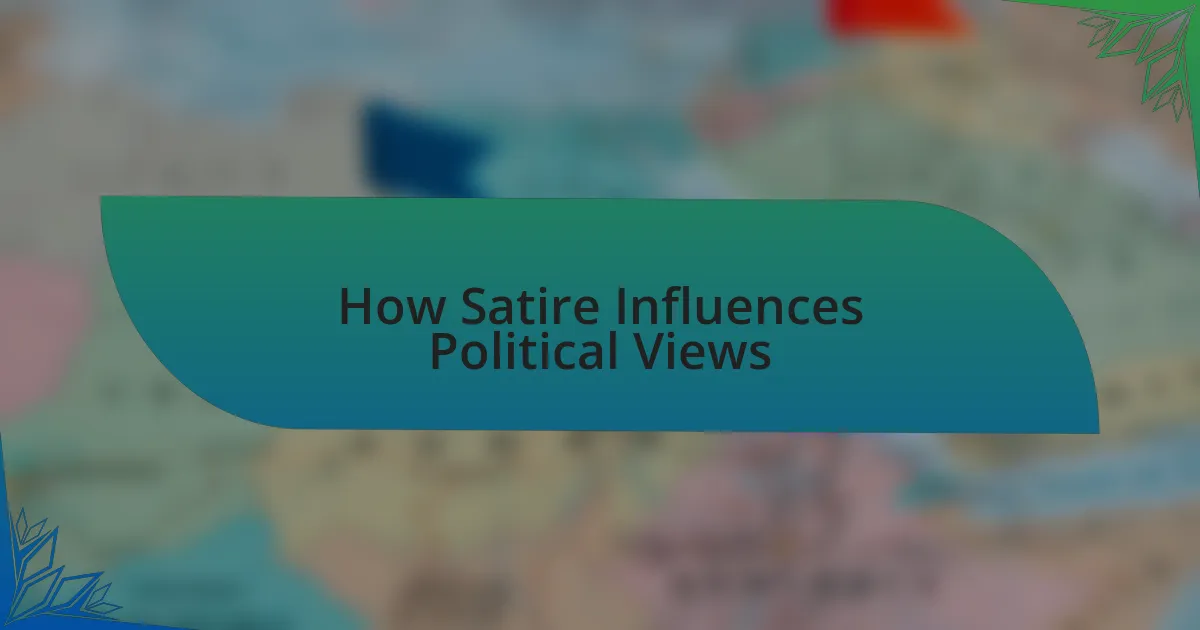
How Satire Influences Political Views
Satire has a unique ability to illuminate the absurdities of politics, often in ways traditional news cannot. I remember watching a satirical piece on the implications of gerrymandering, where the comedian exaggerated electoral maps to absurd levels. This humorous portrayal made the complexities of political manipulation clearer, allowing me to grasp just how ridiculous the situation was. Why don’t we see this kind of clarity in standard political coverage?
Furthermore, I’ve noticed that satirical commentary often serves as a wake-up call for many viewers. During a segment on climate change, a comedian used exaggerated analogies that stuck with me long after the show ended. The laughter was a gateway, allowing uncomfortable truths to penetrate deeper than they might have in a serious discussion. It’s fascinating how a light-hearted approach can stir genuine concern and urgency around crucial topics. Do you find that humor makes it easier to tackle serious conversations?
Ultimately, satire can provoke crucial discussions among peers, driving home points that might be easily glossed over in the news. During a recent gathering, a friend shared a hilarious sketch about political debates, which sparked a deeper conversation about political accountability and transparency. This blend of humor and critical thought fostered an environment where we all felt safe to express our opinions. How powerful is it that laughter can be a catalyst for such meaningful dialogue?